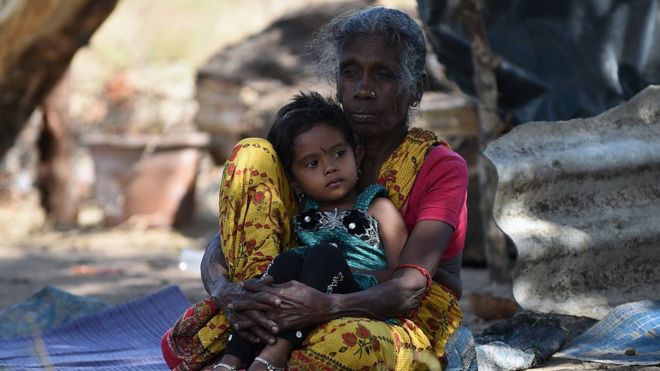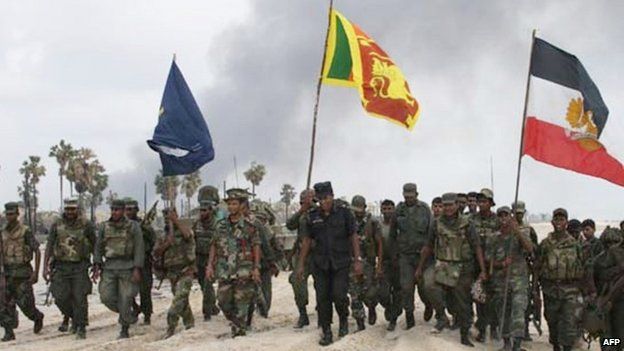Sri Lanka judge says war crimes claims are ‘credible’
-
21 October 2015

copyrightAFP Many Tamils are still homeless after the war – countless others are missing
A government-appointed Sri Lankan judge says allegations the army committed war crimes during the long conflict with Tamil Tiger rebels are “credible”.
He was leading the first government inquiry into the atrocities, one month after the UN released its own findings.
President Maithripala Sirisena has pledged a truth and reconciliation commission to investigate further but resists calls for a foreign inquiry.
The 26-year war left at least 100,000 people dead.
The UK’s Channel 4 and the UN have documented numerous atrocitiescommitted during the war, with one investigation saying up to 40,000 people may have been in killed in the final five months alone.
Others suggest the number of deaths could be even higher.
‘White Flag’ case
The government tabled retired judge Maxwell Paranagama’s finding in a report to parliament on Tuesday.
The judge said there were “credible allegations which… may show that some members of the armed forces committed acts during the final phase of the war that amounted to war crimes giving rise to individual criminal responsibility”.
He went to say there was evidence to suggest that footage obtained by the Channel 4 documentary No Fire Zone – showing prisoners naked, blindfolded, with arms tied and shot dead by soldiers – was genuine.
Sri Lanka’s military at the time had dismissed the documentary as a fabrication.
The Paranagama commission also said a case involving the killing of the top Tamil Tiger political leadership in May 2009 – known as the “White Flag” case – should be investigated.
He called on the government to set up an internationally-backed judicial inquiry, which was also recommended in the UN report in September.

Image copyrightAFP Both the army and Tamil Tiger rebels are accused of committing war crimes at the end of the war in 2009
The first government-led inquiry into the allegations was commissioned in 2013 by then-President Mahinda Rajapakse, who oversaw the final push against the rebels in 2009.
Mr Rajapaksa has always denied his troops committed war crimes, and resisted international inquiries.
The UN’s long-awaited report accused both sides of atrocities, especially during the final stages of the war in 2009.
Its main findings include:
- numerous unlawful killings between 2002 and 2011, allegedly by both sides
- enforced disappearances affecting tens of thousands over decades
- the “brutal use of torture” by security forces, in particular during the immediate aftermath of the conflict
- extensive sexual violence against detainees by the security forces “with men as likely to be victims as women”
- forced recruitment of adults and children by the rebels, particularly towards the end of the conflict
The final months of the war saw hundreds of thousands of Tamil civilians trapped in territory held by the Tamil Tigers (LTTE) in the north-east.
While government forces were accused of indiscriminate shelling leading to massive casualties, the Tamil Tiger rebels were alleged to have used civilians as human shields and shot people trying to escape.
Allegations persist to this day that the army killed rebel leaders and others after they surrendered or were captured – and the UN admitted in 2012 that it could and should have done more to protect civilians.
As well as the thousands of Tamils who died in the final battles near Mullaitivu, many others are still missing.